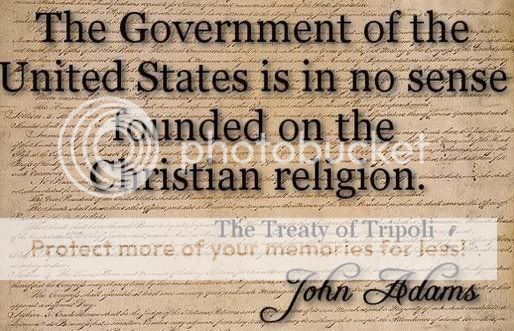hortysir
In Memorial of 47
As is usuallly the case in such shallow questions, we really don't know what we are agreeing or disagreeing with.
What does it mean to be "founded upon" ?
Does it mean that the FF intended that the principles and tenents of the "Christian Religion" be incorporated into and enforced in the Constitution ?
Or does it mean that the Christian religion was considered, front and center, as the Constitution was written ?
What I am very sure of is that:
The founders had a great desire not to see a national religion forced upon the American people and thus made sure that it was quite clear that the federal government was to make no laws regarding the establishment of religion. That was the federal government. Jefferson, in his oft-quoted letter (which many mistakenly believe is the langugue of the Constition) describes a wall of separation. Clearly, the FF did not want any religion to have the power to enforce moral codes or policy preferences through elected officials and enforce them through the legal system.
At the same time, it is quite clear that most of the founders had a strong faith in God and in man and believed that cooperative living would only be had by people living their conciences.
As I read the "intellectual" in-breds who squawk about how the Founders were not Christians...I have to laugh. It is quite clear they were. And the very things they cherrished in their religion, tolerance, acceptance, forgivness, patience, etc. etc. are written in to a document they felt would allow the athiest and Christian alike to co-existe....from any compulsion by the government to belong to or support something they did not believe.
That did not stop the states from behaving differently. And, in fact, several states did engage in some form of support for either a particular religion or the Christian religion in general. This was never challenged (to the best of my knowledge) but disappeared on it's own.
Recent challenges by local entities to do things like display the ten commandments have been struck down under the perversion we call "incorporation", a doctrine the SCOTUS pulleld out of it's ass via the ambiguously written 14th amendment.
Back to my point.
The United States of America does was not created to enforce, nor was it contemplated it would ever enforce a state sponsored a religion. In that sense, the U.S. was not founded as a Christian nation.
BTW: It should be noted that John Adams comments are meaningless on this point. It is a delcaration. It does not bind the U.S. to anything. We can be as Christian as we chose to be.
At that same time, it is also clear that the U.S. was founded upon personal principles that are center to the teaching of Christ. To the exent that the two are linked, the U.S. could very easinly be considered to be founded upon the Christian Religion.
I voted for "other" simply because the question is not clear enough as to what it is asking.

I'm sorry.....What were you saying??





